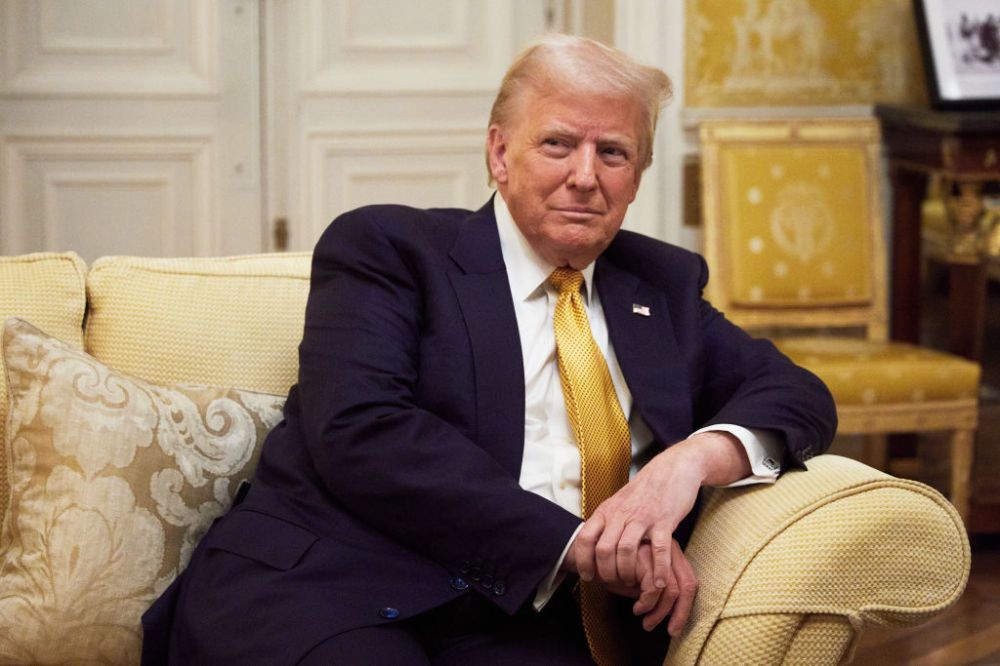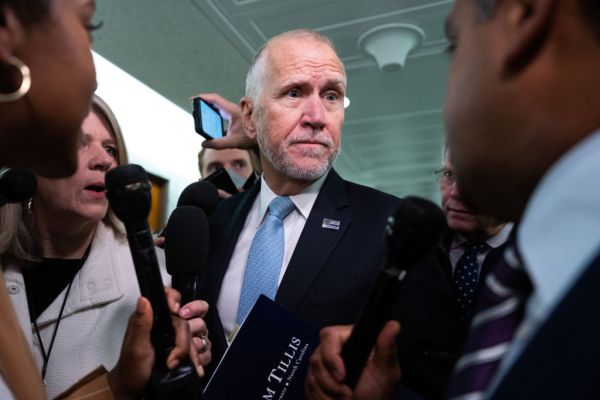One of the many grim political traditions America has developed since 2015 is liberal rags churning out “How to barely tolerate your MAGA relatives during the holidays” pieces each winter. They’re usually unreadable dreck—but on Sunday the New York Times published a banger.
The Times piece wasn’t a how-to, it was a vignette about a family living in rural Georgia. The subject was an illegal immigrant who came to the United States from Mexico as a child, grew up here, married an American, and now has a temporary work permit thanks to Barack Obama. His father-in-law is a veteran and corrections officer who’s been stockpiling emergency supplies in case the government comes for him and believes the country urgently needs to “shut down the infiltration on the border.” Guess whom he voted for last month.
If you thought Christmas small talk was awkward between a blue-haired niece and her red-capped uncle, imagine the chitchat around this dinner table.
Apparently the father-in-law has been keen to reassure his son-in-law that when he complains about “infiltration” he’s not complaining about him. “All those criminals that Trump’s been talking about—the rapists, the gang members—that’s not you,” the Times quotes him as saying. “You deserve to be here. To me, you’re basically American.” But legally I’m not, his son-in-law was quick to remind him. When you elect a government promising “mass deportation,” you should expect mass deportation.
Should we, though?
On Monday the Wall Street Journal noticed that Team Trump has begun inching away from its plans to deport millions upon millions of illegal immigrants, angering hardline border hawks. Tom Homan, his new border czar, said last week that deportations will be targeted rather than involve “neighborhood sweeps and military vehicles going through the city.” Reportedly he’s told aides that the administration should prioritize people who are easiest to reach, like criminals and those with orders of deportation pending against them.
That’s basically Joe Biden’s policy, a frustrated Trump ally grumbled to the Journal. As if that weren’t bad enough, Trump himself has sounded gung ho lately to legalize so-called DREAMers like the subject of the Times story, which should make Christmas dinner in rural Georgia this year much more festive.
Immigration isn’t the only subject on which he’s begun to retreat, though. After spending the campaign promising Americans in sweeping terms that reelecting him would bring prices down everywhere, he’s changed his tune. Asked recently by Time magazine about grocery bills, he replied, "I'd like to bring them down. It's hard to bring things down once they're up. You know, it's very hard.”
The two most salient issues on November 5 were inflation and chaos at the border. Trump’s advantages on them were almost certainly the difference between victory and defeat. Now here he is, barely a month removed from victory, scrambling to lower expectations for each.
Even the miracle cure he offered as a candidate for America’s economic ills no longer sounds so miraculous. When he was challenged by a reporter a week ago to guarantee that his new tariff regime wouldn't raise the cost of living, he answered, “I can’t guarantee anything. I can’t guarantee tomorrow.”
Quite a climbdown, all told. What’s driving it?
Second verse, different from the first.
Politicians campaign in poetry and govern in prose, the saying goes. Every candidate overpromises on the trail.
But a candidate who’s running for president mainly in hopes of avoiding prison? Why, he’ll say any ol’ thing he needs to say to win, feasible or not.
Trump was prone to say any ol’ thing even when he wasn’t staring at time in the clink, of course. He’s a born huckster, constitutionally given to ridiculous hype, with no qualms about veering into con artistry to get his way. He’s the monorail guy from The Simpsons, basically; it was plain during the campaign to anyone with an ounce of skepticism that he was selling magic beans.
So the easy answer to the question I posed is, “Trump is Trump.” He said what he needed to say to win, and now he’s free to level with people about the limits of what’s possible. The federal government doesn’t have the resources to deport 15 million people, obviously. The president doesn’t have a lever he can pull to reduce prices, especially if he’s set on starting trade wars with every country in the world. And no, contrary to what you may have heard, the White House can’t end the war between Russia and Ukraine in 24 hours.
He conned Americans, and now he’s lobbying them to be realistic before he takes office. Simple as that.
But the simple explanation is boring—and probably incomplete. The nature of his second presidential victory is sufficiently different from his first that it’s worth wondering if his policies on matters like immigration and tariffs will be more moderate than expected because he wants it that way, not just because his promises as a candidate were infeasible.
In 2016 he lost the popular vote en route to winning the presidency. He was deeply—let me stress, deeply—unpopular, more so even than Hillary Clinton. His victory was widely viewed as a combination of Republican turnout turbocharged by the promise of getting to fill Antonin Scalia’s seat on the Supreme Court and undecided voters reluctantly preferring him on lesser-of-two-evils grounds to the establishment dynast Clinton.
He had a narrow coalition, in theory, one that depended heavily on keeping the GOP base happy.
In 2024, on the other hand, he became the first Republican in 20 years to win the national popular vote. He’s no longer deeply unpopular: For the first time since he entered politics nearly 10 years ago, his favorable rating turned net-positive earlier this month. And his support is no longer narrow nor does it derive mainly from the sense that he’s marginally less obnoxious than his liberal opponent. He’s given the GOP real traction with working-class voters of all races, to the point that one could argue that Republicans have become a truer coalition of diverse factions than Democrats.
Oh, and unlike in his first term, he’s now term-limited. (I think?) All of this will potentially influence his political incentives.
To Trump skeptics like me, it will influence them for the worse. Because he’ll never again need to face the voters, and because he was reelected after Americans saw what he was capable of on January 6, there’s nothing restraining his worst authoritarian impulses now. But from a policy standpoint you can turn that logic on its head: Because he’ll never again stand for election, and because his base has broadened considerably beyond the right, there’s nothing restraining his impulses toward governing more moderately than expected on issues like immigration, either.
Now that he’s gotten a taste of real popularity, in fact, a pathological narcissist like him might find it intoxicating. Instead of pandering to MAGA die-hards, he might feel liberated to try to further expand his base of public support by governing from the center.
He’s already benefited from the possibility.
Abortion and immigration.
According to exit polls, by a margin of more than 2-to-1, voters said that abortion should be legal rather than illegal.
But when they were asked which candidate they trusted more to handle the issue, Kamala Harris edged out Trump only barely, at 49-46. She crushed him among radical pro-choicers who believe abortion should be legal in all cases—yet, remarkably, among those who believe it should be legal in most cases, he fought her to an outright draw of 49-49.
That’s a neat trick for a guy who appointed the justices who cast the key votes to overturn Roe v. Wade. At last check, overturning Roe was less popular than even Joe Biden.
Trump spent a lot of political capital during the campaign restyling himself as an abortion moderate, a pro-lifer whom pro-choicers could trust not to meddle with blue states where the practice was legal. It worked. We’ll know soon whether that was just another empty promise from which he intends to retreat once he’s president—certainly, his pro-life advisers hope so—but his rebranding as a moderate was so successful electorally that one wonders if he might not keep his word to protect his popularity. The fact that his pick to head the Department of Health and Human Services is pro-choice is suggestive, no?
The lesson he learned from tacking to the center on abortion might influence his thinking on immigration: That is, his base is so devoted to him that all but the most die-hard ideologues will excuse and ultimately accept his pivots toward moderation.
In 2020, before he began his great climbdown on abortion, he took 76 percent of the white evangelical vote on Election Day. Four years later, with the climbdown in full swing, he took … 82 percent. One of his sharpest pro-life critics during the campaign was Live Action President Lila Rose, who told the BBC in September that “our movement’s goal is not just to accept whatever the least worst candidate is and show up for them.” When November 5 rolled around, she did exactly that.
Politically, right-wingers are the cheapest of dates. Trump has always understood that, which is why he didn’t bother reaching out to Nikki Haley’s conservative base after she dropped out of the primary. He knew they’d fold eventually, and they did. In the end, he paid no political price for moderating on abortion.
So why would he think he’d pay a price for moderating on immigration or tariffs or Ukraine?
Immigration might be different, admittedly. It’s been his pet issue since day one in 2015 and it lies at the heart of populists’ obsession with who is and isn’t a “real American.” His fans won’t give him limitless grace to moderate on border enforcement. In fact, the public is eager to see him follow through: A poll earlier this year found 51 percent in favor of “mass deportations.”
But when you read the fine print, you’ll see that many Americans distinguish between “mass” deportation and deporting all unlawful immigrants, as some hardliners would like to do. A CNN exit poll on Election Day found 56 percent support offering illegals some form of legal status, with a quarter of Trump’s own voters favoring a path to citizenship. A Pew Research survey published this summer showed similar support for legalization.
When Americans say they support “mass deportation,” I suspect they mean they want the feds to deport many more illegals than they already do—but not everyone. Those with a criminal record need to go, as do those who have been ordered deported but haven’t been removed yet; coincidentally, that’s precisely whom Tom Homan wants to focus on. But the entire illegal population? C’mon.
If Trump managed to deport no more than a few hundred thousand criminal aliens on the one hand, with lots of splashy Fox News footage of ICE marching shackled MS-13 gang members to waiting planes, and on the other agreed to legalize DREAMers and go easy on illegals who are holding down jobs, my guess is that Republicans would be thrilled and the American middle would be impressed and gratified. His popularity would jump.
Restrictionist think tanks and lobbyist groups would call him a sellout, but who cares? So did Lila Rose. So what? Frankly, it’d be just deserts if Trump ended up selling out populists on their core issues. Postliberals have done such a good job of indoctrinating the right into blind authoritarian worship that they’ve functionally decoupled Trump’s support from his policies, giving him an unusual degree of freedom to maneuver without fearing that he’ll alienate his base by doing so.
Nothing would be funnier than if Trump cultism ultimately led to a bunch of legalization initiatives for immigrants in his second term.
Strange new respect.
In sussing all of this out, don’t underestimate Trump’s desire to be respected by polite society.
For all his money and celebrity, he’s seemingly never shed the chip on his shoulder of being viewed by Manhattan’s elite as a gauche outer-borough tabloid freak who doesn’t quite belong. His origin story as a political villain, in fact, is that he was so enraged by Barack Obama making fun of him in a roomful of beautiful people at the 2011 White House Correspondents Dinner that he resolved to show them a thing or two by running for president.
That’s populism in a nutshell, no? It’s never about hating the elites for being corrupt and always about hating the elites for not wanting you in the club.
It’s an open question how Donald Trump would respond if those elites suddenly gave him the thing he’s been after all these years: their respect. It seems to be on his mind, too. “In the first term, everybody was fighting me,” he told reporters at a press conference on Monday when asked about his recent dinner with Apple CEO Tim Cook. “In this term, everybody wants to be my friend. I don’t know, my personality changed or something.”
Having resisted a vindictive strongman during his first term on the assumption that his presidency was a fluke, the beautiful people—upon realizing that it wasn’t—have made a rational calculation that “a new approach” might work better. They’re going to offer him strange new respect and see where that gets them. At a minimum, it might keep the secret police at the Justice Department off their backs once Trump and Kash Patel are done installing loyalists there.
But pleasing his new “friends” might also make him more amenable to moderating on policy. Lower corporate taxes, more visas for high-skilled foreign workers, and a lighter hand than expected on mass deportation: With Trump, flattery might get them everywhere.
Well … not everywhere. There are some terrible ideas to which he’s so wedded that he probably can’t be talked out of them. But I don’t fault them for wondering if the “Trump unleashed” dynamic of a second term in which he’s popular and term-limited might be co-opted to work to their advantage. He no longer needs to worry about the American center, which is terrifying—but he also no longer needs to worry about postliberals, which is encouraging. If the worst we get from the next four years is Trump being anointed as an “elite” and toasted at swanky parties he attends by people his fans hate, we’ll have gotten off lucky.







Please note that we at The Dispatch hold ourselves, our work, and our commenters to a higher standard than other places on the internet. We welcome comments that foster genuine debate or discussion—including comments critical of us or our work—but responses that include ad hominem attacks on fellow Dispatch members or are intended to stoke fear and anger may be moderated.
With your membership, you only have the ability to comment on The Morning Dispatch articles. Consider upgrading to join the conversation everywhere.